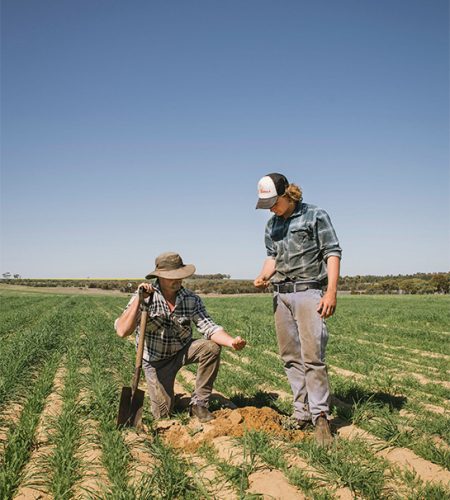Key Points
- Improved understanding of farmer decision making can help to improve long-term soil health and productivity, inform strategic planning and build innovation capacity.
- Landholders across North Central Victoria, Eyre Peninsula South Australia and Northern Wheatbelt Western Australia were surveyed to find out what drives their farm management decisions.
- Passing on a healthy and sustainable farm for future generations was the most commonly held value for farmers across all three regions.
- Looking after family and their needs, preventing pollution, protecting natural resources, and creating wealth and striving for a financially profitable business were other important values.
- Just under half of full-time farmers saw themselves as ‘early adopters’, while only a third ‘prefer to avoid risks’.
- Soil erosion due to wind or water, low biological activity in soils and the declining nutrient status of soils are important property-wide issues across all three regions
- Beliefs around climate change varied across regions, with Northern Wheatbelt of Western Australia having the highest percentage of farmers agreeing that climate change is due to human activity, and that it is a risk to the region.
- Regardless of climate change beliefs, changing weather patterns emerged as the most important regional challenge across Australian farming systems, followed by public support or opposition for agricultural practices.
The Challenge
Farmer decisions greatly impact long-term soil health and productivity. To gain a thorough understanding of the factors driving landholder decision-making within and across regions, we need to research the drivers of farmer decision-making.
The Opportunity
1. We can use results of well-designed surveys to build a sound database, which can then inform strategic planning and build innovation capacity for regional and state partners, as well as the Soil CRC.
2. When the surveys are repeated a few years later, we can examine long term trends.
3. We can share our rigorous research results with interested students, researchers and the public, thereby providing insights into the issues farmers face, and the factors driving their decision-making.
Our Research
We applied high-quality rural sociology research techniques to explore the complex factors driving the management of soils and landscapes.
Our objective is to gain a thorough understanding of the drivers of on-farm decision making across Australian farming systems. Our survey focused on three regions: the Western Australian Wheatbelt, the Eyre Peninsula of South Australia and North Central Victoria.
The survey approach and instrument built on previous work by Professor Allan Curtis of Charles Sturt University, with an added emphasis on soils. Questionnaires were physically mailed to landholdings over ten hectares in the the chosen region, to either a random selection or everyone, depending on the region’s population. Several reminders to complete the questionnaires were also sent by mail.
Farmers were asked about actual and intended practices, their challenges, and aspirations. We also sought answers about on-farm management styles and farmer values, as well as items that focus on self-assessed knowledge of, and confidence in, best practice and perceptions of risk.
While the survey included core questions, some questions were regionally specific to reflect local priorities. This customisation also extended to the analysis, which focussed on areas highlighted as being of particular importance to our local research partners.
Outcomes
- Analysis of the questionnaire results indicate future changes in important issues and values across farming regions in Australia.
- The overarching Soil CRC project will collate a dataset of national significance reflecting the many factors involved in on-farm decision-making for Australian farmers.
- The survey will act as a framework to conduct further research both cross sectionally and longitudinally.
Next Steps
This project provides a snapshot of current issues and commonalties of farmers in selected areas. The snapshot can inform Soil CRC researchers and extension agents and enable them to develop improved ways to engage with farmers, and target efforts regarding what is important to farmers. Farming practices and social issues will change over time, thus the repetition of these surveys later in the Soil CRC research program will provide valuable longitudinal data.
Read the full reports on each of the three surveys.

